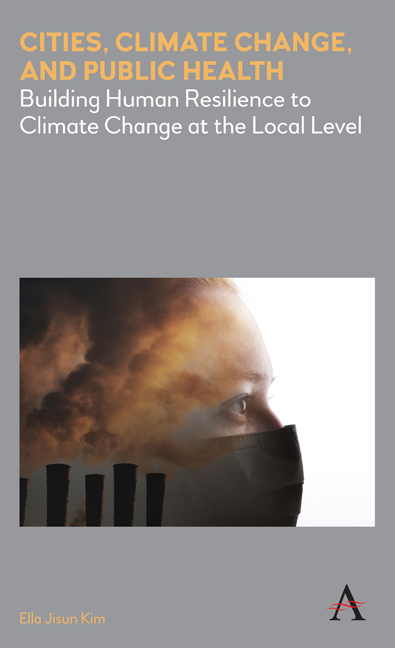 Cities, Climate Change, and Public Health
Cities, Climate Change, and Public Health Book contents
- Frontmatter
- Dedication
- Contents
- List of Figures and Tables
- Acknowledgments
- Chapter 1 Introduction
- Chapter 2 Cities, Climate Change, and Public Health
- Chapter 3 Collective Climate Adaptation at the Local Level
- Chapter 4 Framing Climate Change as a Public Health Issue
- Chapter 5 Role-Play Simulations
- Chapter 6 Digital Games
- Chapter 7 Role-Play Simulations versus Digital Games
- Chapter 8 Discussion and Policy Recommendations
- Appendix A Issue Framing Vignettes
- Appendix B Issue Framing Survey Questions
- Appendix C Role-Play Simulation Before-Survey Questions
- Appendix D Role-Play Simulation After-Survey Questions
- Appendix E Role-Play Simulation Facilitator Questionnaire
- Appendix F Role-Play Simulation Debriefing Script
- Appendix G Role-Play Simulation Post-Game Interview Questions
- Appendix H Role-Play Simulation Workshop Sample Characteristics
- Appendix I Digital Game Before-Survey Questions
- Appendix J Digital Game After-Survey Questions
- Appendix K Digital Game Post-Game Interview Questions
- Appendix L Digital Game Sample Characteristics
- References
- Index
Chapter 2 - Cities, Climate Change, and Public Health
Published online by Cambridge University Press: 06 May 2020
- Frontmatter
- Dedication
- Contents
- List of Figures and Tables
- Acknowledgments
- Chapter 1 Introduction
- Chapter 2 Cities, Climate Change, and Public Health
- Chapter 3 Collective Climate Adaptation at the Local Level
- Chapter 4 Framing Climate Change as a Public Health Issue
- Chapter 5 Role-Play Simulations
- Chapter 6 Digital Games
- Chapter 7 Role-Play Simulations versus Digital Games
- Chapter 8 Discussion and Policy Recommendations
- Appendix A Issue Framing Vignettes
- Appendix B Issue Framing Survey Questions
- Appendix C Role-Play Simulation Before-Survey Questions
- Appendix D Role-Play Simulation After-Survey Questions
- Appendix E Role-Play Simulation Facilitator Questionnaire
- Appendix F Role-Play Simulation Debriefing Script
- Appendix G Role-Play Simulation Post-Game Interview Questions
- Appendix H Role-Play Simulation Workshop Sample Characteristics
- Appendix I Digital Game Before-Survey Questions
- Appendix J Digital Game After-Survey Questions
- Appendix K Digital Game Post-Game Interview Questions
- Appendix L Digital Game Sample Characteristics
- References
- Index
Summary
Health Impacts of Climate Change
Over the last decade, deaths, injuries, and other health problems from floods, droughts, and other climate-related disasters cost an estimated $14 billion in the United States (IPCC 2014; USGRPC 2016; Watts et al., 2015, 1864). Climate change poses a series of significant and far-reaching threats to human health and well-being all over the world (IPCC, 2014; Kinney et al., 2015; Luber et al., 2014; USGCRP 2016), leading the World Health Organization (WHO) to declare climate change as the defining issue for public health in the twenty-first century (Chan 2006). In 2019, over seventy health organizations in the United States, including the American Medical Association and American Heart Association, issued a climate policy agenda to avert a public health crisis, calling climate change “one of the greatest threats to health America has ever faced” (Devitt 2019).
Focusing on climate-health linkages, Table 2.1 details how each climate impact translates into public health outcomes and indicates the populations most vulnerable to climate-sensitive health threats.
Planning for and Managing the Health Impacts of Climate Change Climate change can affect health in two ways. As the climate continues to change, the risks to our health and well-being grow, due to either (1) an increase in the severity or frequency of health problems already affected by climate or weather factors or (2) unprecedented health problems in places where they did not previously occur (USGCRP 2016, ch. 1).
It is important to note that many climate-sensitive health outcomes are inherently place-specific. For instance, Stone's work on extreme heat documents how temperatures in cities can increase as much from local urban heat island effects as from global climate change impacts (Stone 2012). Sailor et al. (2016) find that this phenomenon tends to be underreported, as the IPCC's and other international and national climate assessments tend to focus on global average ambient air temperatures instead of locally experienced thermal stress, which is also dependent on surface temperatures, air pollution, humidity, and wind speeds (Sailor et al. 2016; Stone 2012).
- Type
- Chapter
- Information
- Cities, Climate Change, and Public HealthBuilding Human Resilience to Climate Change at the Local Level, pp. 5 - 12Publisher: Anthem PressPrint publication year: 2020


